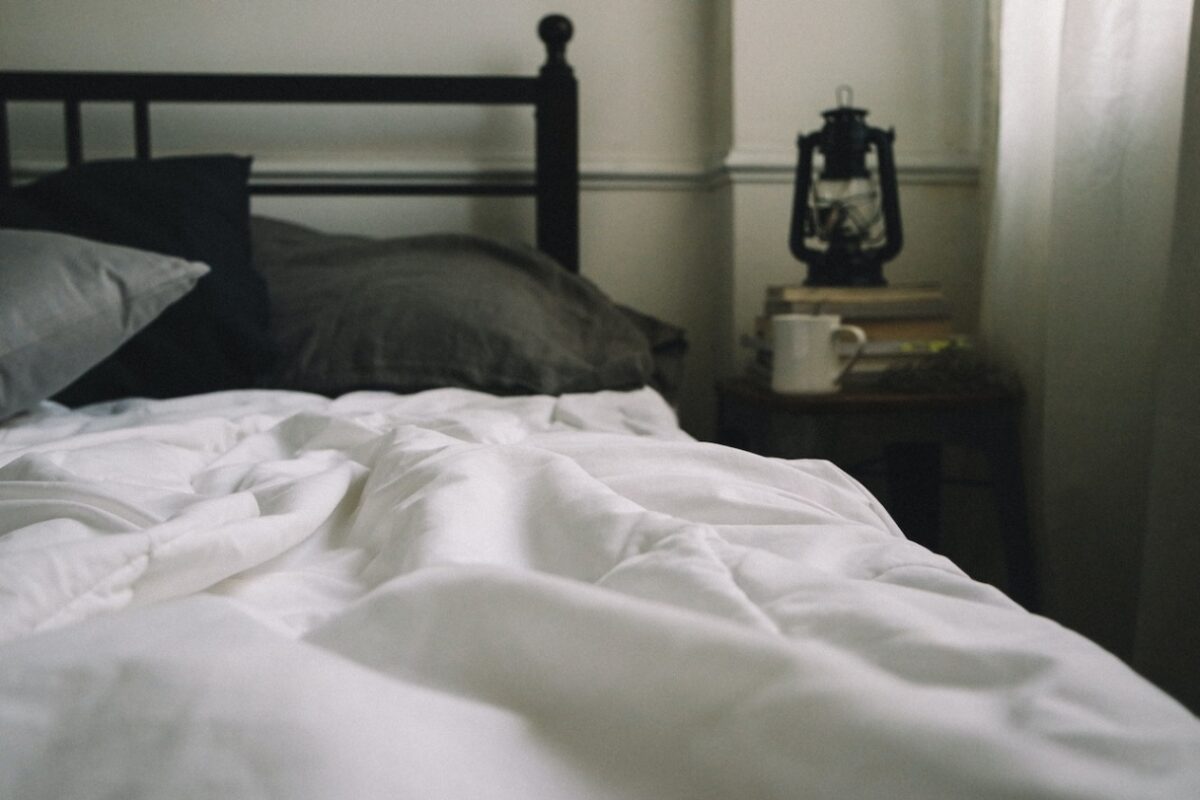Insomnia: What to Do When You Can't Sleep
The causes of insomnia, and what to do when you can’t sleep

This therapist directory is offered in partnership with BetterHelp. If you sign up for therapy after clicking through from this site, HelpGuide will earn a commission. This helps us continue our nonprofit mission and continue to be there as a free mental health resource for everyone.
Need to talk to someone now? Find a crisis helpline
If you're a BetterHelp therapist with questions about your directory listing, please contact therapists@betterhelp.com
The COVID-19 pandemic has disrupted many aspects of our lives, including how well we sleep at night. These tips can help you overcome insomnia and get the rest you need.

The global coronavirus pandemic has changed much about our lives in the last few months, and that includes our sleeping patterns. Isolation, loss of work, economic and health worries, and disruption to your work, school, and home life can increase stress, anxiety, and depression. These, in turn, can play havoc with your quality of sleep. You may toss and turn at night, unable to sleep no matter how tired you feel, or wake up in the middle of the night and struggle to get back to sleep. Some people report being plagued by bad dreams. Others find they’re sleeping in later and later but still feel groggy and unrefreshed when they wake up.
Insomnia and other sleep disorders can take a heavy toll on your physical and mental health. Skimping on quality sleep can impact your energy, focus, and ability to function during the day, especially if you have the added pressure of trying to work from home or homeschool your kids. A lack of quality sleep can also make you moody and irritable, exacerbate symptoms of anxiety and depression, and even lower your immune system.
While sleep problems are common at the best of times, all the stress, worry, and turmoil created by this pandemic have made existing sleep difficulties even worse—and triggered new sleep problems in those who used to be “good sleepers”. Even as some stay-at-home restrictions start to lift, many challenges seem likely to remain. But by taking these steps to address your sleep problems, you can end the frustration of lying awake for hours and finally get a good night’s rest.
BetterHelp is an online therapy service that matches you to licensed, accredited therapists who can help with depression, anxiety, relationships, and more. Take the assessment and get matched with a therapist in as little as 48 hours.
Take Assessment HelpGuide is user supported. We earn a commission if you sign up for BetterHelp’s services after clicking through from this site. Learn moreSocial distancing, school closures, working from home, widespread layoffs and furloughs, and worries about staying healthy have combined to make this a disruptive and distressing time. Your daily routines and habits have likely been turned upside down, you may be worried about all the uncertainty in the world, and your stress levels have probably skyrocketed. You may also be grieving the loss of loved ones or facing severe economic difficulties. All these factors add up to a perfect recipe for insomnia and other sleep problems.
Some of the ways the coronavirus pandemic can impact your sleep include:
Increasing stress, anxiety, and worry. You may be worried about your own or your loved ones’ health, stressed about money and the economy, or anxious about what the future holds. Whatever the cause, when your body produces more of the stress hormone cortisol it can keep your body aroused, your mind turning, and lead to fragmented sleep and insomnia.
Disrupting your daily schedule. In many places, schools, offices, and gyms are still closed, your social life has been curtailed, and your normal daily routines are a distant memory. If you’re out of work and confined to home, you have no set time to wake up each day, eat meals, or get dressed. This can disrupt your body’s natural sleep-wake cycle or circadian rhythm, as can spending less time outside in sunlight each day.
Creating feelings of isolation. Quarantine and social distancing can cut you off from family and friends and trigger symptoms of depression and a variety of sleep problems.
Prompting you to spend more time on screens. Whether you’re working on a computer at home, video chatting with friends, or bingeing on Netflix shows, you’re likely spending more time in front of a screen than ever before. The blue light emitted by your phone, tablet, computer, or TV disrupts the body’s production of melatonin at night, a hormone that helps regulate your sleep-wake cycle.
Leading you to consume more alcohol. During these traumatic times, you may be drinking more than usual to relieve stress and boredom, or to help you drop off at night. But while alcohol may help you to fall asleep, it interferes with your sleep cycle, causing you to wake up multiple times during the night, leaving you feeling tired and unrefreshed in the morning.
Promoting unpleasant dreams. Many people have reported having intense, troubling dreams and nightmares during this pandemic. In extreme cases, anxiety can prompt disturbing dreams, but for most people, vivid dreaming is down to stress increasing how much you recall of your dreams. The more fragmented your sleep and the more often you wake from REM (dreaming) sleep during the night, the more likely you are to remember your dreams.
With so much uncertainty in the world at the moment, it’s no wonder so many of us are struggling to get to sleep at night. You may be anxious about what’s going to happen next, stressed about work and finances, or worried about your family’s health and safety as the world starts to reopen after lockdown.
When you’re stressed and desperate for some rest, it can be tempting to resort to sleeping pills and sleep aids. But medication doesn’t address the underlying cause of your sleep problems and can actually make insomnia worse in the long run. Instead, there are healthy ways to tackle your stress, anxiety, and worry, and make it easier to sleep.
Practice a relaxation technique. Incorporating a relaxation technique such as meditation, progressive muscle relaxation, or a breathing exercise into your bedtime routine can help relax and prepare you for sleep. If you wake up during the night, practicing an audio meditation can also help you stay out of your head and get back to sleep without the endless tossing and turning.
Deal with worries. Whether worrying stops you from getting to sleep or if you wake during the night feeling anxious about something, you can learn to “postpone” worrying. Establish a set time each day as your worry period where you allow yourself free rein to worry about whatever’s on your mind for an hour. When a worry keeps you awake at night, make a brief note of it and postpone worrying about it until your worry period the next day.
Get active during the day. Regular exercise can help ease stress and anxiety, increase the amount of time you spend in the deep, restorative stages of sleep at night, and improve any symptoms of insomnia. Even though gyms, swimming pools, and fitness centers may still be closed in your area, there are plenty of ways to exercise safely during coronavirus. Just don’t work out too close to bedtime or it may further interfere with your sleep.
Many of us have experienced drastic changes to our daily and night-time routines during this pandemic. If you’re working from home, it can be difficult to establish a clear separation between work and leisure time. If you’ve been furloughed or laid off, you may have lost all normal structure to your day, going to bed and waking up at different times.
While there’s no need to replicate your schedule from before the onset of this health crisis, establishing a new daily routine and keeping a regular sleep-wake schedule are crucial to improving your sleep.
Structure your days. Try to get up at the same time each day, even if you have no job to go to, kids to take to school, or social events to attend. If you’re working, maintain normal work hours wherever possible. Establishing a structure helps to set your body’s internal clock and optimize the quality of your sleep, so try to also be consistent about when you eat, exercise, and spend time outside.
Set a regular bedtime. To avoid tossing and turning or staring at the clock, choose a time for bed when you normally feel tired. If you’re getting the right amount of sleep, you should wake up naturally without an alarm. If you need to keep hitting the snooze button in the morning, it may be a sign you need an earlier bedtime.
Improve your sleep environment. Make sure your bedroom is cool, dark, and quiet to help you sleep at night. You also want to ensure your mattress is comfortable.
Create a relaxing nightly routine. Turn off screens at least one hour before bed and spend the time unwinding and preparing your body and mind for sleep. You could try reading by a soft light, listening to calming music or an audio book, taking a bath, gently stretching, or meditating.
Reserve your bedroom for sleep. Where your bedroom was once solely a place for sleep, it may now also be somewhere you work, home school the kids, exercise, or grab a few minutes to yourself throughout the day. The more you can restrict your bedroom to just sleep (and sex), the more your mind will associate it with sleep and the easier it will be to unwind at night.
All the disruption and added stress of the COVID-19 pandemic may have caused you to develop some unhealthy daytime habits, which can disrupt your sleep at night. Not only can poor daytime habits contribute to sleep problems, but a poor night’s sleep can make these habits harder to correct, creating a vicious cycle. For example, you sleep badly at night so feel too tired to exercise during the day, which in turn makes it harder to sleep.
Keeping a sleep diary can help you identify which daytime habits and behaviors may be contributing to your sleep difficulties at night. These tips can also help:
Find new ways to connect with loved ones. Even if you’re in quarantine or observing social distancing, that doesn’t mean you should feel isolated and alone at this time. While nothing helps to relieve anxiety and stress like old-fashioned face-to-face contact, you can still stay connected via video link, phone, or social media. Scheduling regular contact with those who matter most to you can improve your mood as well as your sleep.
Eat a healthy diet. Many of us turn to comfort foods when we’re bored, stressed, or anxious. But these tend to be high in sugar and refined carbohydrates, which make it harder to fall and stay asleep at night. Limiting your alcohol and caffeine intake can also help to improve the quality of your sleep.
Minimize naps. If you’re out of work and at home all day, it’s tempting to try to make up for a poor night’s sleep by taking a nap during the day. But napping for too long or too late in the day can make your sleep problems even worse. Try to limit naps to no more than 20 minutes in the early afternoon.
Make time for yourself. Whatever your commitments and responsibilities during this difficult time, it’s important to make time for activities you enjoy. Whether it’s painting, writing, spending time in nature, or playing with a pet, adding joy to your life can help you relax and get a better night’s sleep.
Last updated or reviewed on January 16, 2025Millions of readers rely on HelpGuide.org for free, evidence-based resources to understand and navigate mental health challenges. Please donate today to help us save, support, and change lives.
Donate to HelpGuide.org today